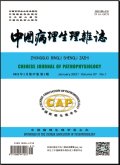中国病理生理杂志2024,Vol.40Issue(6):1017-1024,8.DOI:10.3969/j.issn.1000-4718.2024.06.007
不同强度运动改善PTSD小鼠恐惧记忆泛化及促海马神经再生效应研究
Different exercise intensity alleviates fear memory generalization in PTSD mice by promoting adiponectin mediated adult hippocampal neurogene-sis
摘要
Abstract
AIM:To explore the intensity-dependent effects of exercises to alleviate fear memory generaliza-tion in post-traumatic stress disorder(PTSD)and the underlying mechanism.METHODS:Male C57 BL/6J mice were randomly divided into the control group,PTSD group,high-intensity exercise(PTSD-High)group,and low-intensity exer-cise(PTSD-Low)group.PTSD model were created via using a combination of conditioned foot shock(CF)and single-pro-longed stress(SPS).The contextual fear test was used to test the mice's ability to discriminate safety situations from fear condition.Immunofluorescence observed and quantified the newborn immature neurons in the DG area of the mice's hippo-campus.ELISA was used to determine the secretion level of serum tissue adiponectin.RESULTS:(1)The immobility times for the PTSD-High and Control groups were significantly lower than those of the PTSD group.(2)Immunofluores-cence analysis showed that the cell density,dendritic branching points and length of newborn immature neurons were ele-vated in High and Low groups compared to the PTSD group.(3)Adiponectin levels in the serum of the control and PTSD-High group were significantly higher than those in the PTSD group and PTSD-Low group.CONCLUSION:Fear memory establishment in PTSD mice is associated with decreased hippocampal neurogenesis.High-intensity exercise ameliorated fear memory by enhancing adiponectin secretion and promoting hippocampal neurogenesis.High-intensity exercise exerted better improvement of brain functions to PTSD model.关键词
运动强度/脂联素/海马神经再生/创伤后应激障碍/恐惧记忆泛化Key words
exercise intensity/adiponectin/adult hippocampal neurogenesis/post-traumatic stress disorder/fear memory generalization分类
医药卫生引用本文复制引用
金硕,张晓晓,吉宸萱,孙丽娜..不同强度运动改善PTSD小鼠恐惧记忆泛化及促海马神经再生效应研究[J].中国病理生理杂志,2024,40(6):1017-1024,8.基金项目
国家自然科学基金资助项目(No.32000835) (No.32000835)
北京师范大学认知神经科学与学习国家重点实验室开放课题(No.CNLZD2104) (No.CNLZD2104)

